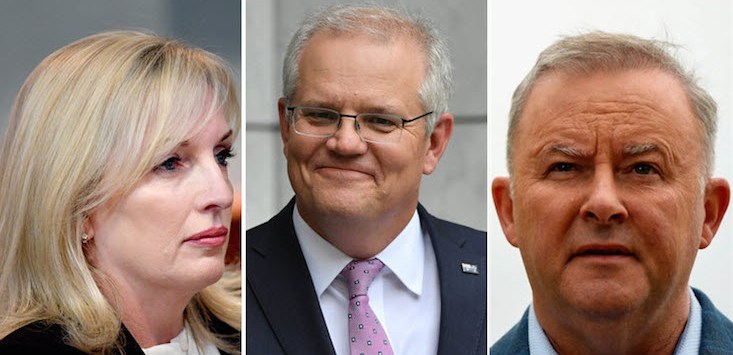
Source: Crikey/AAP
More than 400 years ago, English bishop Joseph Hall famously declared: “A reputation once broken may possibly be repaired, but the world will always keep their eyes on the spot where the crack was.”
The Christine Holgate debacle has seriously damaged quite a few reputations. Some may never be fully repaired, and the world will certainly not forget anytime soon.
For an issue that began over a relatively trivial matter, the list of candidates for reputational damage is long and shameful.
Not just Holgate herself and Australia Post chair Lucio Di Bartolomeo, but also Prime Minister Scott Morrison; government ministers who jumped on the bandwagon of shame; opposition politicians including Anthony Albanese who couldn’t resist joining the pile-on; and the media and commentators who helped inflate the issue to the biggest daylight robbery since a contractor at the Perth Mint stuffed gold bars and coins down his trousers.
With the current Senate inquiry focused almost entirely on who knew what when — and whether the former Australia Post chief executive jumped or was pushed — the ripples of reputational damage continue to spread.
But this highly politicised process seems to have lost sight of the triggering event. Let’s not forget that after Holgate approved the purchase of luxury watches as a reward for some senior executives, a subsequent government investigation, led by the Finance and Communications Departments and assisted by Maddocks law firm, cleared her of “dishonesty, fraud, corruption or intentional misuse” of taxpayer funds.
However, the report also concluded that her action “may be inconsistent with public expectations”. As Holgate herself said at the time, “I had done nothing wrong in this matter, other than failing the ‘pub test’ for some.”
Behaviour that is undeniably ‘inconsistent with public expectations” — or simply “fails the pub test” — seems to be a regular event in politics over recent months, but it so far hasn’t warranted the full court press of a parliamentary inquiry. In fact, some of the alleged offenders are still drawing comfortable government salaries.
So what lessons can be drawn from the affair of Christine Holgate and those luxury watches?
The first and most obvious is that when party politics is driving the process, and when the central player is an articulate and successful woman, nothing can stop the personal damage.
Secondly, “public expectation” has become little more than a rubric for whatever suits the political and media agenda.
Finally, and importantly for issue and crisis management generally, it is clear that once a story like this starts to run, facts provide little to no real protection for those involved.
The first government-led investigation determined that Holgate had basically done nothing wrong. And Australia Post chair Di Bartolomeo has told the current inquiry Holgate was treated “abysmally”; that in his view she was good at her job; and that the purchase of the watches “was an error of judgment made in good faith from an otherwise highly effective CEO”.
Sadly, none of that seems to matter and none of that makes the headlines. The truth is that when political reputations and the voting majority in the Parliament House are at stake, facts become dispensable and the reputation of a “highly effective CEO” is just collateral damage which will likely never be fully repaired.
Tony Jaques is an expert on issue and crisis management and risk communication. He is CEO of Melbourne-based consultancy Issue Outcomes and his latest book is Crisis Counsel: Navigating Legal and Communication Conflict.
This article was first published by Crikey.
Handpicked for you

Licenced post offices slam a confidential review into Australia Post, saying more privatisation will come at a cost to post offices and rural communitites



COMMENTS
SmartCompany is committed to hosting lively discussions. Help us keep the conversation useful, interesting and welcoming. We aim to publish comments quickly in the interest of promoting robust conversation, but we’re a small team and we deploy filters to protect against legal risk. Occasionally your comment may be held up while it is being reviewed, but we’re working as fast as we can to keep the conversation rolling.
The SmartCompany comment section is members-only content. Please subscribe to leave a comment.
The SmartCompany comment section is members-only content. Please login to leave a comment.